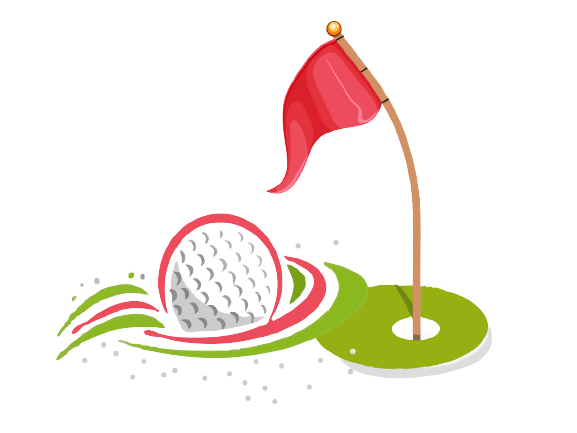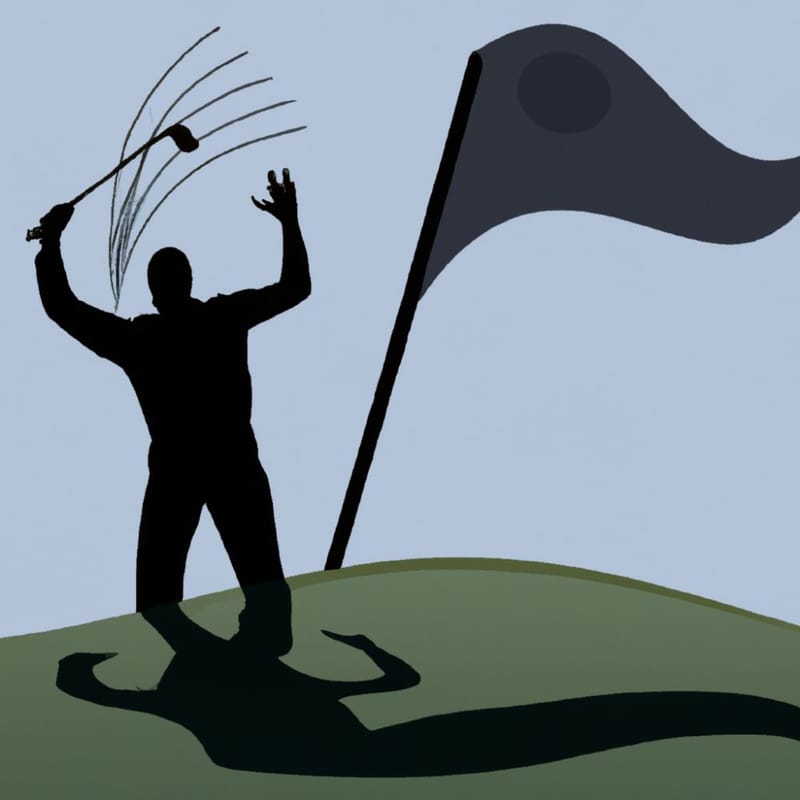Content Summary
Introduction to Four-Ball in Golf
Four-ball in golf is a competitive match play format that pits two teams of two golfers against one another, where each golfer plays their own ball throughout the round.
It is sometimes called “better ball” because the team’s score for the hole is determined by choosing the best score among the four players.
The winner of a four-ball match is typically determined either by accumulating more points over a set number of holes or completing an 18-hole round with fewer strokes than their opponents.
At its core, four-ball in golf focuses on team work and helping your partner out while trying to beat your opponents.
Whether it's walking up to survey each shot, strategizing how to play a tough hole or simply offering moral support – four-ball presents an opportunity for golfers to help one another out and enjoy playing the game together even when competing for individual bragging rights and team glory.
History of Four-Ball in Golf
Four-ball golf is one of the oldest forms of golf, dating back to the early 19th century in Scotland. It was first recorded as a variation of foursome match play in 1810 when an article appeared in the Scotsman newspaper describing a four-ball match between two pairs of professional golfers on the Old Course at St Andrews.
In four-ball, each player plays his or her own ball and counts the best score on each hole, usually compared to par. The lowest score from either team wins the hole.
The Modern Version of Four-ball Golf
It is often used chiefly for tournament and match play formats with pairs competing against one another, but it may also be played socially or casually with friends.
It is considered one of the most popular formats among amateur and professional players alike with several regional and national tournaments taking place throughout the year. Four-ball has become an increasingly popular option among professionals during major events such as the Ryder Cup and Presidents Cup.
Rules and Regulations of Four-Ball in Golf
It can be played in either match play or stroke play formats with teams being either pre-determined partners or randomly seeded in a scratch draw usually from a single handicap range.
In four-ball golf, both players hit their tee shots on each hole and then decide which of their balls will be used for the remainder of that hole.
In match play, if one partner of a side has holed out first but his partner's ball continues to advance, he must wait for his partner to finish before picking up his side's final score for that hole.
All Rules Under The Rules of Golf
The USGA defines the differences in four-ball match play and four-ball stroke play in Rule 30 for match play and Rule 31 for stroke play. As compiled by The R&A and USGA all rules apply in general throughout any four-ball round including simultaneous rulings when needed as long as it does not involve making decisions on behalf of another player’s shot outcomes.
When playing friendly games it is advisable for sides to agree in advance upon additional local rules that might be specific for that particular game such as allowing “concessions” from other contestants per etiquette regulations.
However if such arrangements involve influencing distance related decisions then this cannot apply unless allowed under USGA Pace Of Play guidelines concerning multiple balls per group on certain Tee times sets (i2).
Benefits of Playing Four-Ball in Golf
Four-ball in golf is a format for match play which involves two teams of two players competing against each other over 18 holes.
Each team combines their best score on each hole to eventually determine the winner and tiebreakers. Four-ball puts a unique twist on regular match play by allowing teams to work together and strategize as they play through the holes.
Playing four-ball can have a number of beneficial impacts for players, requiring them to hone their individual technique, communication skills and strategy, working together for team success. It's not about only one score but the team score.
- For those new to match play formats, four-ball can be a great way to familiarize themselves with different competitive strategies and team competitions.
- Due to its competitive nature, playing four-ball helps develop mental sharpness in golfers who need to find solutions while playing under pressure.
- Outings featuring this format are usually great opportunities for amateur golfers and social groups that want more experience in the game's individual rules and etiquette too.
- It also provides an opportunity for players of all handicaps within the same group or team, enabling novices who may not feel comfortable taking part in formal competitions or tournaments by themselves yet still participate alongside others.
- By playing against another team, four ball gives each player an equal opportunity at success during each hole; however due to its Score: best ball format it also encourages good sportsmanship among all players involved as well as other virtues such as camaraderie and respect for one another's game performances. Competitors play to win but in a jovial environment.
- It’s likely that through participating in such outings personal relationships between partners will be strengthened too – something which can reach beyond golf course successes into daily life down lessons learned on course too!
Strategies for Playing Four-Ball in Golf
The most important aspect of playing four-ball in golf is having effective strategies to lower your combined team score. Understanding what type of shot to hit and how you and your partner can work together on the course is essential for success in this format. If you're partner fails on a particular hole you can carry them for that hole and vice versa.
Some strategies for playing four-ball include:
- Choosing the Right Partner: Your partner should have similar skills and playing styles so that way you can trust each other on the course to make smart decisions. It’s also important that you are both comfortable with each other’s game, so it’s easier to communicate during competition play.
- Choosing Club & Shot Selection: Depending on how far away your teammate’s ball is from yours, it might make sense for one person to hit a driver or an iron depending on everyone's approach shots and situation rather than both teeing off with a driver or an iron each time.
- Also, try not to play too aggressively if one player ends up hitting behind another or in a difficult spot, as you don't want to give up points unnecessarily.
- Communicate & Work Together: Before shots off of the tee box, decide who’ll be hitting first in order for both you and your partner to agree when making club selection decisions moving forward throughout the hole, taking into account wind speeds and locations of hazards before playing a shot.
- Then when it comes time to play those shots – build each other up instead of bringing an individual shot attempt down with negative rhetoric – confidence will stir through strong communication during these situations.
- Decision Making: Finally two individuals must actively come together and establish decisions off the tee box – do we want to layup? Do we want one person attacking greens while another stays further back? Do we need someone further left/right?
- Decisions made during four-ball rounds should be beneficial processes within moments rather than debate amongst team members over longer sides if possible – it all allows for faster play between partners and more efficient scoring through rounds by weighing options towards curtailing strokes overall from hole 1 through 18!
Common Mistakes to Avoid when Playing Four-Ball in Golf
Playing four-ball in golf can be a fun and challenging way to compete in the sport. As with any game, there are certain common mistakes that can easily be avoided if you know what to look out for.
Here are some of the most common mistakes made when playing four-ball in golf and how you can avoid them:
- Not Team Playing: One of the biggest issues is when one or more players play as individuals rather than as a team.
- When playing four-ball, it is important that all members of the team work together to select shots and make decisions on how to approach the course. If a player is making moves without consulting their team first, this could put the entire team at a major disadvantage.
- Not Understanding Golf Course Rules: Making sure that your entire team understands all applicable golf rules before beginning is key to success. Proper etiquette also should be followed, as well as awareness of any hazards on the course before approaching a ball or taking a shot.
- Taking Too Long During Shots: This can be frustrating not only for your own teammates but also for competitors waiting behind you while you take too many practice swings or won’t ever commit to taking your shot.
- Have all members know their limitations before beginning and move quickly during each round so gameplay isn’t held up for too long by one especially slow player, potentially resulting in anger from other players waiting behind you on each course.
- Forgetting About Course Conditions: Be sure that when selecting teams shots and playing them out, account for wind speeds, terrain conditions (slopes), common stray areas (woods or thickets) and geographical area effects (chillier temperatures at higher altitudes).
Conclusion
In conclusion, Four-Ball in golf is a game type that is played between four players. It is usually played as stroke play and the lower score between the two teammates out of each pairing are counted towards the team score. This game type can also be played using alternate shot, scramble and best ball formats.
While all players get to compete against one another in Four-Ball, it is typically seen as more of a team based competition compared to other games such as Match Play or Stroke Play.
Whether you are competing in a tournament or just playing for fun with your friends or family members, Four Ball can add variety and excitement to your next round.
Thank you for visiting and we hope to see you back soon!
Note: We use affiliate links and may receive a small commission on purchases at no additional cost to you.






